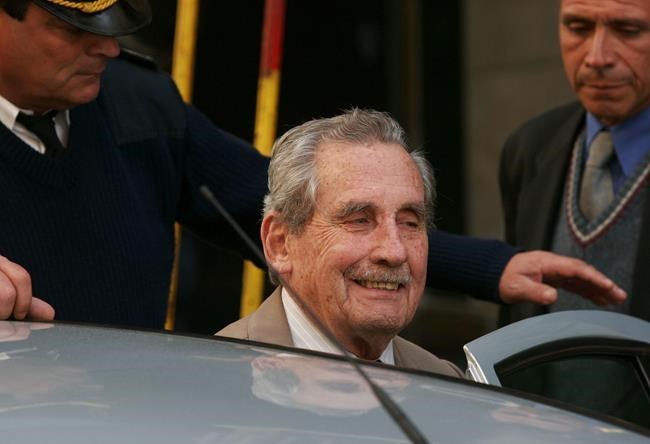
FILE - In this Nov. 5, 2007 file photo, former Uruguayan dictator Gregorio Alvarez arrives to court in Montevideo, Uruguay. Alvarez, the last de facto president of the dictatorship that ruled Uruguay between 1973 and 1985, died on Wednesday, Dec. 28, 2016. He was 91. (AP Photo/Alejandro Arigon, File)
Republished December 28, 2016 - 10:08 AM
Original Publication Date December 28, 2016 - 8:40 AM
MONTEVIDEO, Uruguay - Gen. Gregorio Alvarez, the last leader of Uruguay's brutal dictatorship of the 1970s and 80s died Wednesday at age 91 while serving a sentence for human rights abuses.
The military's health service said he died at the Central Hospital of the Armed Forces in Uruguay's capital.
Under Alvarez, Uruguay was part of the secret alliance of South American dictatorships known as "Operation Condor" in which the military leaders co-operated in persecuting and killing one another's dissidents.
Alvarez, himself the son of a general, participated in the 1973 coup that dissolved congress following a government crackdown on the Marxist Tupamaro rebels who were trying to seize power by force. One of Alvarez's brothers was killed by Tupamaro attackers in 1972.
Alvarez became army chief in 1978, finally taking over the presidency in 1981. His government imprisoned democratic critics and censored the press.
Alvarez finally agreed to hand over power to an elected civilian government in 1984 as the wave of dictatorships in the region was starting to recede. Argentina's military rule ended a year earlier and Brazil's a year later.
Hundreds of suspected leftists were arrested and tortured during the dictatorship and historians say an estimated 180 Uruguayans were killed — most of them while in the custody of the government's Argentine allies.
In 2009, Alvarez was sentenced to 25 years in prison for his responsibility in the death or disappearance of 37 Uruguayans under Operation Condor.
During his trial, Alvarez said he knew nothing of illegal abductions and forced disappearances.
Prosecutors argued that Alvarez was in a position to know what happened to the political prisoners as army commander in chief and later as de facto president.
News from © The Associated Press, 2016